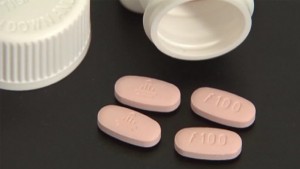 NORTH CAROLINA, United States, Friday August 21, 2015 – The US Food and Drug Administration (FDA) t1his week approved flibanserin, a libido-enhancing drug for women that has been dubbed “Female Viagra.”
NORTH CAROLINA, United States, Friday August 21, 2015 – The US Food and Drug Administration (FDA) t1his week approved flibanserin, a libido-enhancing drug for women that has been dubbed “Female Viagra.”
Produced by North Carolina-based Sprout Pharmaceuticals, the pill is designed to help premenopausal women regain their sex drive by balancing levels of serotonin and dopamine in the brain.
The drug has nevertheless already sparked controversy and been criticised for having marginal effects, with women reporting “between half and one more sexually satisfying event per month” – results experts admitted were “modest.”
The BBC reports that versions of the pill, which will be marketed as “Addyi,” have been submitted for approval in the past but have never been passed.
The drug was rejected twice by the FDA for lack of effectiveness and side effects like nausea, low blood pressure, dizziness and fainting.
The drug was originally produced by German company Boehringer Ingelheim. Sprout Pharmaceuticals bought the drug from that company after it was turned down by the FDA.
Sprout resubmitted an application for approval this year, along with additional safety studies, according to The Washington Post.
In June, an FDA advisory committee voted 18-6 to recommend that the FDA approve flibanserin, with certain conditions, such as warning labels against using the drug with alcohol, some birth control pills and certain anti-fungal medications. Even then, the committee described the drug’s benefit as “moderate” or “marginal.”
Critics have dismissed flibanserin as unproven and overhyped. They point out that the drug has very clear adverse side effects, like sleepiness, dizziness, nausea and fainting, which apparently can be worsened when combined with alcohol, while providing only middling results in treating Hypoactive Sexual Desire Disorder (HSDD), or low female sex drive.
Sprout Pharmaceuticals nevertheless presented results from double-blind clinical trials showing the drug worked better than a placebo to boost women’s sexual desire.
The company argued that after 24 weeks, as many as 60 per cent of the women in the trials had benefited from flibanserin – although some committee members said that after adjusting the data to account for the placebo effect, the drug helped only about 10 per cent of the women in the trials.
Large pharmaceutical companies like Pfizer, Bayer and Proctor & Gamble have all studied female sexual interest/arousal disorder (FSIAD) treatment, but abandoned plans to pursue it.
Sprout’s CEO, Cindy Whitehead, nevertheless maintained her faith in the product and told the Associated Press that they would promote Addyi carefully.
“We would never want a patient who’s not going to see a benefit to take it and tell everyone it doesn’t work,” she said.
Lobbying by Sprout Pharmaceuticals was also backed by the women’s rights group “Even the Score”, which has accused the FDA of gender bias by approving a number of drugs treating erectile dysfunction in men without passing an equivalent for women.
Meanwhile, Sprout says the potential market for flibanserin could include 16 million women. The company eventually hopes to win expanded FDA approval for the drug to market it to menopausal and post-menopausal women, further expanding its reach.
Currently, there is nothing on the US market approved for treatment of HSDD or FSIAD.
